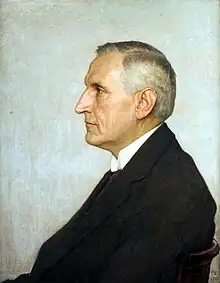Johannes Kuenen
Johannes Petrus Kuenen (Leiden, 11 October 1866 – Leiden, 25 September 1922) was a Dutch physicist.

Biography
.jpg.webp)
Kuenen was the son of the professor of theology Abraham Kuenen and his wife Wiepkje Muurling. His son Philip Henry Kuenen was professor of geology. From 1884 to 1889 he studied at the University of Leiden, where he graduated in 1892. He became a professor in physics in 1895 at University College, Dundee in Dundee, Scotland, where he worked until 1907.[1][2] For most of this period the College was part of the University of St Andrews. While at Dundee he performed early experiments with x-rays with the physiologist Edward Waymouth Reid.[3] In 1907 he was appointed professor of physics at Leiden University. Heike Kamerlingh Onnes and Kuenen led the Kamerlingh Onnes physics Laboratory.
On the basis of his scientific work he was elected in 1911 as a member of the Royal Netherlands Academy of Arts and Sciences (KNAW),[4] and became a member of the Hollandsche Maatschappij der Wetenschappen in 1915.
Retrograde condensation
He discovered retrograde condensation and published his findings in 1892 in the Ph.D. thesis with the title "Metingen betreffende het oppervlak van Van der Waals voor mengsels van koolzuur en chloormethyl".[5][6] (Measurements on the Van der Waals surface for mixtures of carbonic acid and methyl chloride).
References
- "Johannes Petrus Kuenen". Archived from the original on 25 November 2009. Retrieved 10 March 2009.
- "Archive Services Online Catalogue". University of Dundee. Retrieved 14 July 2015.
- "Celebrating Science" (PDF). Contact. University of Dundee: 27. December 2012.
- "Johannes Petrus Kuenen (1866 - 1922)" (in Dutch). Royal Netherlands Academy of Arts and Sciences. Retrieved 14 July 2015.
- Johannes Kuenen (1892). "Metingen betreffende het oppervlak van Van der Waals voor mengsels van koolzuur en chloormethyl" (PDF).
- "Measurements on the surface of Van der Waals for mixtures of carbonic acid and methyl chloride" (PDF). Archived from the original (PDF) on 18 May 2005. Retrieved 11 March 2009.